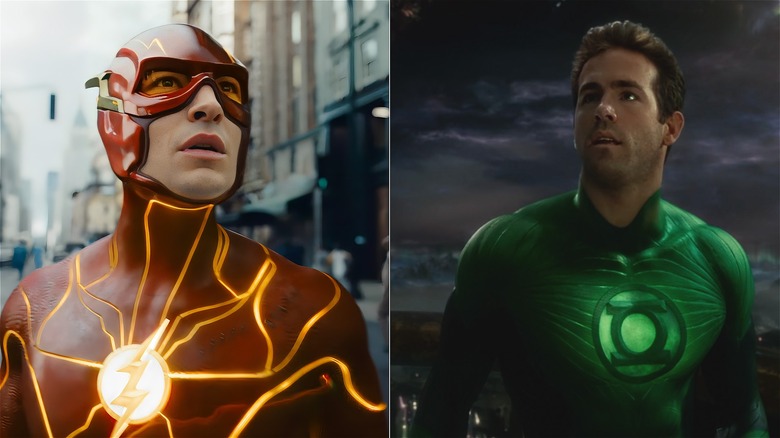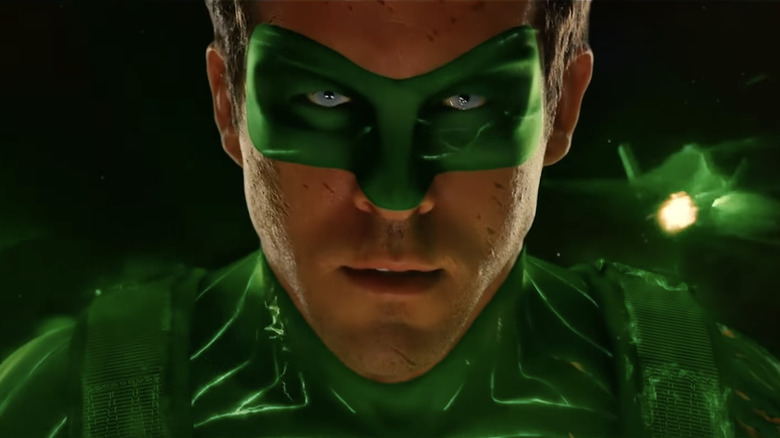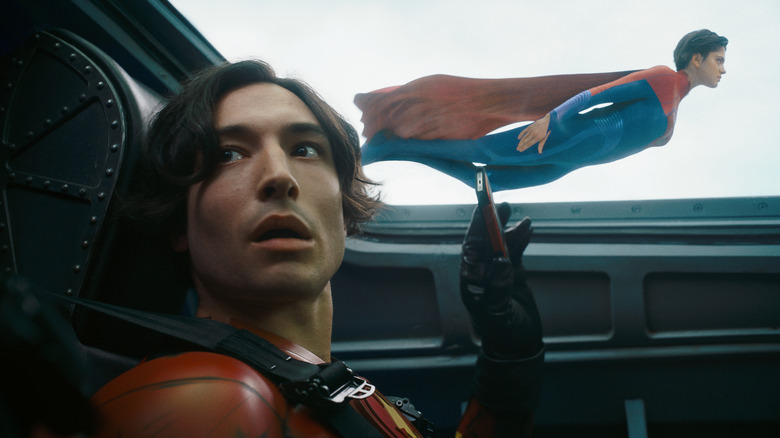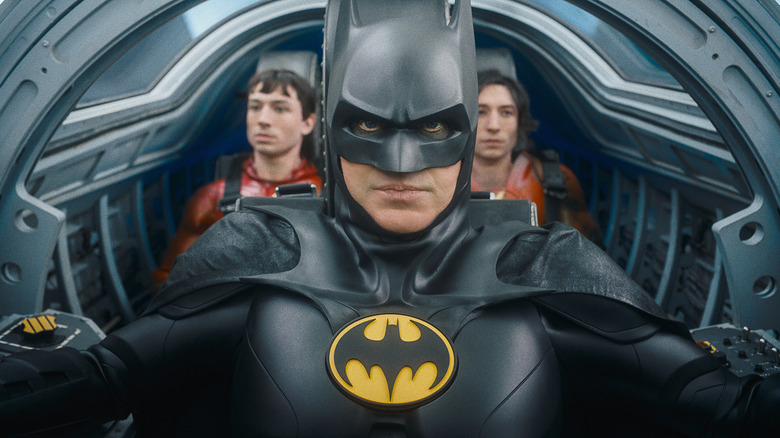Green Lantern Vs. The Flash: Which DC Comics Hero Fared Worse At The Box Office?
When it comes to superhero films, it's assumed that they'll make a pretty chunk of change at the box office. After all, four out of the ten highest-grossing films of all time are superhero flicks. And it seems that, every month or two, a new entry in the genre is gracing cinema halls, compelling audience members to show up on opening weekend to see their favorite character's latest hijinks. To date, the Marvel Cinematic Universe has grossed just over $29.5 billion worldwide, making it one of the most financially viable multimedia franchises out there. Even DC's cinematic output have boasted a few winners, namely 2018's billion-dollar grossing "Aquaman" and Christopher Nolan's "The Dark Knight" trilogy.
While superhero films continue to boast decent profits at the box office, 2023 proves that the bubble is bursting. Or at least that the cracks are beginning to show. In a perfect world "The Flash" — which features a multiverse storyline and the nostalgia-heavy return of Michael Keaton's Batman — would have grossed at least $1 billion. Instead, it bowed out of its theatrical run with a domestic total of $108 million. Globally, the DC film managed to wrack up box office receipts just shy of $270 million, making it one of Warner Bros.' most publicized misfires in recent memory.
"The Flash," which features Ezra Miller in the titular role as the speedster, is just the latest disappointment for DC's theatrical slate. It's even drawing comparisons to Ryan Reynolds' maligned outing as "Green Lantern," which wrapped up its theatrical run with a global gross of $219 million back in 2011, per The Numbers. When it comes to box office receipts and general fan perception, it's clear that "The Flash" is a larger box office disappointment than Reynolds' green-suited cosmic hero.
Green Lantern grossed $116 million domestically
Back in 2011, Warner Bros. Pictures roped Martin Campbell to direct the long-gestating "Green Lantern" flick. Ryan Reynolds joined the production, ready to step into the role of Hal Jordan. Reynolds embodied the crassness and humor of the role well but not even the Canadian actor's charm could save the superhero misfire. In a review for the New York Post, critic Lou Lumenick tore the film apart, describing it as a "a relentlessly silly superhero flick with eyeball-rolling dialogue — set in vast, familiar-looking digital realms that look like rejected models from the second 'Star Wars' trilogy." Audiences agreed with critics, awarding the film a B CinemaScore — a death sentence for what was meant to be a crowd-pleasing flick.
"Green Lantern" opened to a modest $53 million opening weekend — a far cry from the $158 million debut "The Dark Knight boasted in 2008. If word of mouth was solid for Reynolds' superhero outing, "Green Lantern" could have boasted stellar legs. Instead, it fizzled, dropping 66% by its sophomore weekend, bringing home just $18 million. By its fifth weekend, the film was being screened in less than 1,000 cinemas domestically, eventually ending its theatrical run with $116 million. Globally, the film grossed just less than $220 million — failing to recoup its whopping $200 million budget.
Why does Reynolds think "Green Lantern" was a dud? He says that the film focused too much on special effects and not on the essence of the titular character. "There was just too many people spending too much money and when there was a problem rather than say, 'Okay, let's stop spending on special effects and let's think about character ...' and that just never – the thinking was never there to do that," the actor told Variety.
The Flash grossed $108 million domestically
The conversation surrounding "The Flash" and its disappointing run at the box office can't begin without acknowledging the so-called hype behind the speedster's debut flick. Prior to the film's release, several reports emerged that "The Flash" was one of the best superhero films ever made. The film screened at CinemaCon to considerable acclaim, with early hype genuinely having you believing that this was something truly special. Even Tom Cruise got in on the fun, praising the film and its director Andy Muschietti. The positive hype made sense — the film was making use of a multiverse narrative, featured the return of Michael Keaton's Batman, Ben Affleck's Batman, and several other intriguing narrative threads.
The film debuted to $55 million in mid-June, just $3 million more than the debut of "Green Lantern." The film was effectively dead on arrival, suffering a 70% drop in its sophomore weekend, only bringing home $15 million. By the first weekend of July, you'd be hard-pressed to find a multiplex near you carrying the picture. Despite Keaton's Batman front-and-centre in the marketing, international audiences didn't show up thanks to a mediocre $160 million foreign pull. A China release failed to pull in more than $28 million — making this one of the country's biggest Hollywood rejections in recent memory. Deadline reports that the film boasts a budget of $200 million. With a global gross of $268 million, this makes "The Flash" one of the biggest box office disappointments this decade. Box office pundit Luiz Fernando says Warner Bros. likely lost around $200 million on the film, though that number isn't confirmed.
When it comes to the biggest DC Comics hero who flopped at the box office, it's pretty clear that the answer is "The Flash," even though it grossed more globally than "Green Lantern."
The Flash should have been a success
In terms of who suffered the most at the box office, "Green Lantern" technically wins because it globally grossed $219 million, while "The Flash" nabbed a worldwide cume of $268 million — a $49 million difference, which is nothing to scoff at. However, note that "Green Lantern" debuted over a decade before "The Flash" graced cinemas. When adjusted for inflation, the $219 million "Green Lantern" total is just shy of $300 million — a difference of nearly $30 million. It's also important to understand the contemporary cinematic landscape and how it has evolved since 2011. Back when the "Green Lantern" debuted, the so-called golden age of superhero films, or "peak superhero" was still in its infancy. Marvel still hadn't debuted "The Avengers" and DC was still in the early ages of building up its own cinematic universe.
Up until then, the only $1 billion-grossing superhero flick was 2008's "The Dark Knight." While The Caped Crusader's dominance at the box office was an anomaly at the time, it certainly isn't now. According to The Numbers, the average DC Extended Universe film's worldwide total is $507 million. "The Flash," which is filled to the brim with nostalgia bait, recognizable actors, and a compelling enough narrative grossing just over half of the franchise's average is quite damning, showing just how poorly perceived the DC brand is in 2023.
Beyond that, "The Flash" has only grossed $108 million domestically to date. "Green Lantern," meanwhile, boasts a larger domestic total of $116 million. Considering Michael Keaton's debut "Batman" flick made $250 million stateside in 1989, "The Flash" should have been a nostalgia play like "Top Gun: Maverick" or "Jurassic World Dominion." Instead, it fizzled, joining "Green Lantern" as one of Warner Bros.' most notable misfires.



